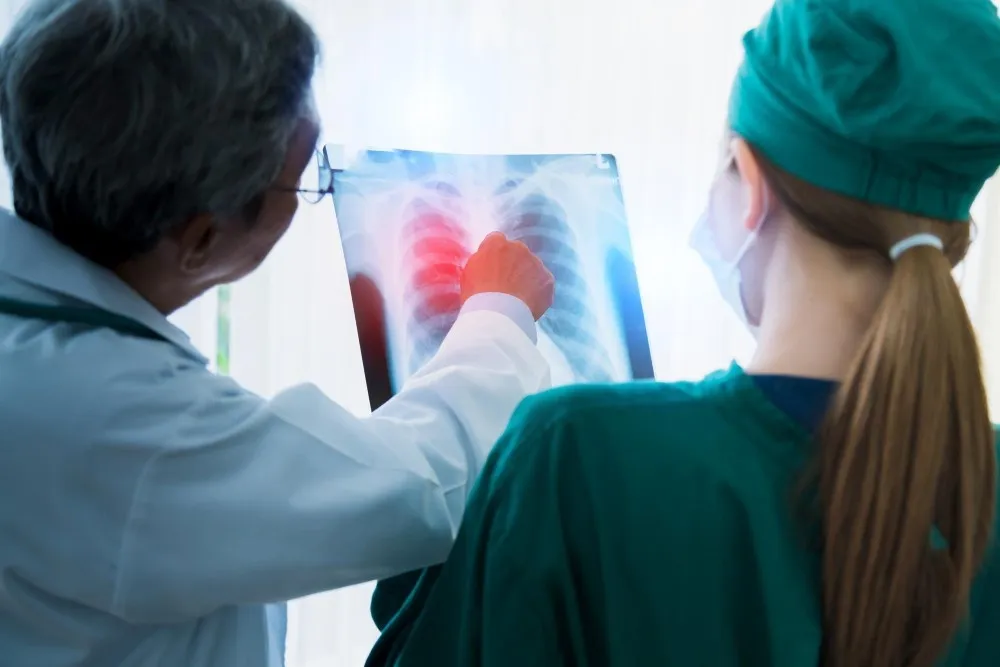What is lung cancer?
It is the cancer that develops in the tissues of lung. More often than not, a lung tumour originates in the walls of the large, branching airways of the lung, the bronchi. More than 20 different types of tumours can develop in the lung itself.There are 1.8 million lung cancer patients all over the world, out of which 1.6 million patients lose their lives. In India, there are more than 70,000 diagnosed cases of lung cancer, more than 90% patients losing their lives.Cancer that forms in the lungs is broadly divided into two types - small cell and non-small cell lung cancer, based on the way the cancer cells appear under a microscope. A cancer can be a mixed one too, with cells of both types present at one time.
#1 Non-Small Cell Lung Cancer (NSCLC)
This is the most common type of cancer afflicting the lung, originating in the cells inside lung airways, commonly in the centre of lungs. Smoking increases the risk of this cancer type. It can be of the following types:- Squamous cell carcinoma- It is usually found in the centre of bronchi and easiest to detect because it shows up in mucous samples. It spreads slowly and can be treated if detected early.
- Adenocarcinoma - This is generally found in the outer part of the lung, common among smokers and even non-smokers.
- Large-cell carcinoma - These are large, abnormal cells that develop on the lung's outer edges. This tumour has a high tendency to spread.
#2 Small-Cell Lung Cancer (SCLC)
This cancer usually develops in the central bronchi and is the most aggressive form of cancer found in lung. It has usually spread (metastasized) to lymph nodes and distant organs by the time the person gets diagnosed.#3 Lung Carcinoid Tumour
Also called as neuroendocrine tumour, it originates in lungs. This type of tumour if further sub-classified into various types. It is relatively less common than the other two types of lung cancer.Who is at risk of developing Lung Cancer?
A lung tumour or cancer may result from the following:- Active Smoking - Tobacco contains over 7000 different chemicals, of which many are known to have carcinogenic properties. Smoking is the biggest cause for cancer in the lung, along with family genetics. A person who smokes one pack of cigarettes daily is about 20 times more likely to develop cancer than a non-smoker. The risk triples in a person who smokes two packs a day.
- Passive smoking - Inhaling tobacco smoke from others or spending a lot of time in smoky areas increases the risk of a person towards this form of cancer. According to WebMD.com, people who share a home with a smoker are at a 30 per cent higher risk of developing this cancer than those who stay in a smoke-free home.
- Exposure to chemicals - People working in certain jobs and industries get exposed to chemicals that harm the lungs. Some common chemicals include asbestos, radon, cadmium, polycyclic aromatic hydrocarbons (PAHs), etc.
- Air pollution - Breathing in polluted air from industrial plants and vehicles over a long period of time expose a person to cancer. The risk is quite similar to that of passive smoking.
- Lung diseases - A lung tumour can grow easily in a lung that has been scarred from a previous infection or disease like tuberculosis, chronic obstructive pulmonary disease (COPD) or scleroderma.
- Genes - Science has discovered a gene on chromosome 6 that can increase the risk of cancerous growth in the lungs. Further, some families seem to be more prone to the cancer than others.
Tagged in
Cancer

Reviewed by







